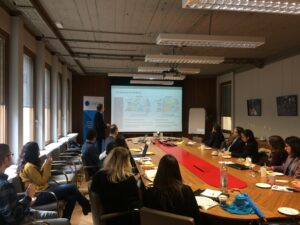12 March 2019
The Grameen Crédit Agricole Foundation was chosen by the United Nations High Commissioner for Refugees and the Swedish International Development and Cooperation Agency (SIDA) to implement a programme of access to financial and non-financial services for refugees and their host communities in Jordan and Uganda.
 The first phase of the programme involved analysing the needs of these refugees in terms of financial services. Philippe Guichandut, Head of the Inclusive Finance Development Division at the Grameen Crédit Agricole Foundation, presented in Luxembourg the results of the study, carried out in collaboration with Microfinanza, as well as the main challenges involved in providing services to this population segment.
The first phase of the programme involved analysing the needs of these refugees in terms of financial services. Philippe Guichandut, Head of the Inclusive Finance Development Division at the Grameen Crédit Agricole Foundation, presented in Luxembourg the results of the study, carried out in collaboration with Microfinanza, as well as the main challenges involved in providing services to this population segment.
Jordan and Uganda are very different countries in terms of the way they host refugee populations, yet both countries face similar challenges. Jordan took in 750,000 refugees (recorded), mainly from Syria. 83% of them do not live in refugee camps. Jordan has a strict regulatory framework leading to difficulties faced by refugees regarding professional integration. Unlike Jordan, Uganda has a more liberal regulatory framework. Uganda took in 1,450,000 refugees, mainly from South Sudan (75%) and the Congo (20%) the majority living in rural refugee camps.
Even though the refugee profiles from these two countries are different, the study very clearly shows that the majority of refugees do not plan to leave their host country and are highly motivated to develop a business. In both countries, refugees have limited access to credit, they also have to deal with difficulties relative to identification and the refugee camps are very poorly served by transport infrastructure.
To provide services to this population segment, it appears essential, among other things, to strengthen partnerships with local players in both countries, foster entrepreneurship, implement support programmes and overcome fears from financial service providers (FSPs) regarding flight risk. The study does not recommend the creation of new financial services specifically for refugees.
Rather, it recommends ensuring microfinance institutions and financial service providers gain a better understanding of the needs of this population in terms of financial services, as well as having a suitable regulatory framework and overcoming social concerns by meeting with refugees.
Advocacy, better coordination and information sharing between the different players in inclusive finance are necessary. It is important to give FSPs the appropriate technical support, for example, regarding marketing or staff training, and to develop non-financial services for refugees such as financial education, and advocacy to reduce reputational risk and provide funding for portfolio growth.
Read the reports on Assessing the Needs of Refugees for Financial and Non-Financial Services in Uganda and Jordan
InFiNe is the Luxembourg platform that brings together public, private and civil society actors involved in inclusive finance. The value of InFiNe lies in the wide range of expertise characterised by the diversity of its members.
With the support of

Inclusive Finance Network Luxembourg
39, rue Glesener
L-1631 Luxembourg
G.-D. de Luxembourg
Tel: +352 28 37 15 09
![]()
R.C.S. : F 9956
Legal notice
Privacy notice
Picture 1 © Pallab Seth
